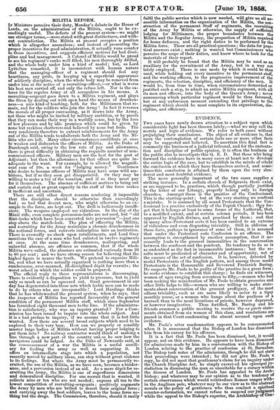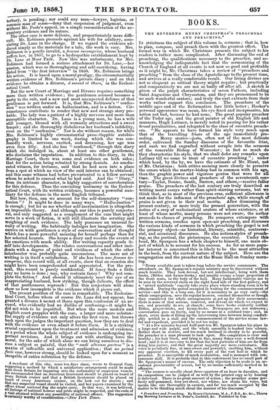EVIDENCE.
Two cases have newly drawn attention to a subject upon which considerable light has been thrown lately,—what we may call the morals and logic of evidence. We refer to both cases without prejudging their conclusions. The object of all evidence is, that upon the contemplation of certain facts one or more other facts may be suggested and believed. To ascertain this final fact is commonly the business of a judicial tribunal, and for the sustenta- tion and discipline of public opinion, it is often the business of the public also to investigate this Q. E. D. But those wile bring forward the evidence have in many eases at heart not to develope- the entire logic of the case, but to establish in the minds of others the conclusion at which they have themselves arrived, and some- times this conclusion is attained by them upon the very slen- derest and most doubtful evidence.
The more generally important of the two cases supplies a' striking instance. In a certain church of Belgravia there exist, or are supposed to be, practices, which though partially justified by the letter of our Liturgy, properly belong only to foreign churches. Amongst these is the practice of the Confessional. This is the starting-point ; but at the very starting we confront a mistake. It is assumed by all sound Protestants that the Con- fessional is a practice exclusively of the Popish Church ; tlry for- get that it belongs at least to some forms of the Lutheran, that, to a modified extent, and at certain solemn periods, it has been approved by English divines, and practised by them ; and that in many ultra-Protestant sects it has been carried to an extreme of ridiculous and even disgusting triviality. Still in oblivion of these facts, perhaps in ignorance of some of them, it is assumed that under the Protestant code Confession is an offence. The assumption is strengthened by another assumption, that it ne- cessarily leads to the grossest immoralities in the conversation between the confessor and the penitent. Its tendency to do so is as undoubted as the fact in innumerable instances ; but the re- sults must be predicated of character and of opportunity, not of the essence of the act of confession. It is, however, detested by model Protestants of the English pattern, and among these model Protestants is the Honourable and Reverend Frederick Baring. He suspects Mr. Poole to be guilty of the practice in a gross form; he seeks evidence to establish this charge ; he finds six witnesses, women of ages ranging from seventeen to fifty,—women who had been seeking the ministration of Mr. Poole to obtain groceries and other little helps to life—women who are willing to make state- ments about conversation of the grossest profligacy, of the most odious triviality, such as are more likely to occur to a tipsy monthly nurse; or a woman who hangs about the purlieus of a barrack than to the most licentious of priests, however depraved, or however imaginative. Thus fortified, Mr. Baring and his friends summon a publics meeting to receive the ex parts state- ments obtained from six women of this class, and resolutions are passed in that Court condemning the absent accused upon such evidence.
Mr. Poole's utter condemnation appears to be consummated when it is announced that the Bishop of London has dismissed him from his curacy for his offences.
It is a fact that Mr. Poole has been dismissed, but, it would appear, not on this evidence. He appears to have been dismissed for admissions made by him in a conversation with the Bishop of London relating to the practice of confession at St. Barnabas. The Bishop took notes of the admissions, though he did not state that proceedings were intended; he did not give Mr. Poole a copy, he did not meet that gentleman's claim for an inquiry under the Church Discipline Act, he simply exercked his episcopal ju- risdiction in dismissing the man as unsuitable for a curacy within the diocese of London. Mr. Poole has appealed to the Arch- bishop ; and whatever may be our opinion as to the tendency of certain observances which would reintroduce Roman usages with- in the Anglican pale, whatever may be our view as to the abstract morals or the policy of gentlemen who thus conduct a spiritual counter-reformation, we cannot refuse to suspend our judgment while the appeal to the Bishop's superior, the Archbishop of Can- tabari, is pending ; nor could any man—lawyer, logician, or common man of sense—deny that suspension of judgment, even without Mr. Poole's appeal, on a simple reconsideration of the ac- cusatory evidence and its nature.
i
The other case s more delicate, and proportionately more diffi- cult. Mr. Robinson proceeds against his wife for adultery, asso- ciating Dr. Lane in the charge. If we regard the evidence ad- duced simply as the materials for a tale, the work is easy. Mrs. Robinson is a gentle invalid, a femme incomprise, whose husband offers her, in 1857, to go to a hydropathic establishment kept by Dr. Lane at Moor Park. Now this was unfortunate, for Mrs. Robinson had formed a serious attachment for Dr. Lane,—her passion, which was so thoroughgoing and self-sacrificing, having dated from "the first interview" in 1850. Mr. Robinson brings his action. It is based upon a moral prodigy, the circumstantially written evidence of Mrs. Robinson's private diary ; and on that evidence he obtains a divorce, d mened et thoro, in the Ecclesi- astical Court.
But the new Court of Marriage and Divorce requires something more than written evidence ; the gentleman accused becomes a party to the suit, and a new and most unexpected defence of that gentleman is put forward. It is, that Mrs. Robinson's " confes- sion" was written under an hallucination, and is a fiction. Cir- cumstances contribute to render that new and strange story pro- bable. The lady was a patient of a highly nervous and more than susceptible character. Dr. Lane is a young man, he has a wife still younger, blessed with all womanly attractions and a sweet temper; and she thoroughly disbelieves her husband's infidelity, even on the "confession." Nor is she without reason, for while Mrs. Robinson's highly circumstantial prose-Sapphic autobio-
rjeffici is limited to one week, during which she was con- y weak, nervous, excited, and dreaming, her age was even then fifty. And she has "confessed," through this diary which she indulged in, about at least one other gentleman, who disclaims the imputation. In addition to this diary, in the Marriage Court, there was some oral evidence on both sides ; that for the action being rebutted by strong denials. An unedu- cated witness, for instance, said that he had seen into a place from a spot at which no view of the said interior can be obtained ; and this same witness had before prevaricated to a fellow servant whom he asked to conceal what he had said. And the "Diary," from its intrinsic character, is highly suggestive of corroboration for this defence. Thus the convicting testimony in the Ecclesi- astical Court, with its written evidence, becomes a powerful aux- iliary for the defence in the more English tribunal. But how, then, can we account for the self-damnatory " con- fession " ? It might be done in many ways. "Hallucination" is enough ; but let us see whether self-incrimination is altogether an impossible theory. And although our idea is purely conjectu- ral, and only suggested as a complement of the case that might serve in a work of fiction, it will still illustrate the scrutiny and weighing of such evidence. The lady possesses an unusual fa- culty of writing. She habitually indulges her imagination. She carries on with gentlemen a style of conversation and of thought which has a more powerful meaning for herself perhaps than for her selected hearers. She keeps a diary and records the events of the emotions with much ability. Her writing capacity goads it- self into developments. She relates conversations and other inci- dents with a degree of point and vividness of which the other interlocutor was probably quite unconscious. The mere act of Writing is in itself a satisfaction. If she has been une femme in- comprise, this record will, at all events, show that on occasion she might have been comprehended and appreciated. For the pre- sent, this record is purely confidential. If fancy finds a little play no harm is done ; nay, why restrain fancy ? Why not com- plete the fiction? And should it ultimately meet the eye of an mappreciating husband, how striking, though delicate, the effect of that posthumous reproach ! But this conjecture will alone show us how incomplete is the evidence which it pieces out. . The present position of the case is remarkable. The Ecclesias- tical Court, before whom of course Dr. Lane did not appear, has granted a divorce a mensâ et thoro upon this confession of an ac- cused, who evidently had no dislike of confessing—it might be, did not wish to be acquitted. But when the more modern and English court grapples with the ease, a larger and more substan- tial supply of evidence not only alters the first view, but throws back upon the judges the important question, how they are to deal with the evidence or even admit it before them. It is a striking crucial experiment upon the treatment and admission of evidence, at a period when the whole subject of evidence is undergoing im- portant revisions. And it brings out with startling force the moral, for the sake of which alone we can bring ourselves to dis- cuss. a subject so painful, that the " audi alteratn partent" is a maxim of inflexible and universal application ; that no prima fame case, however strong, should be looked upon for a moment as incapable of entire refutation by the defence.



























 Previous page
Previous page